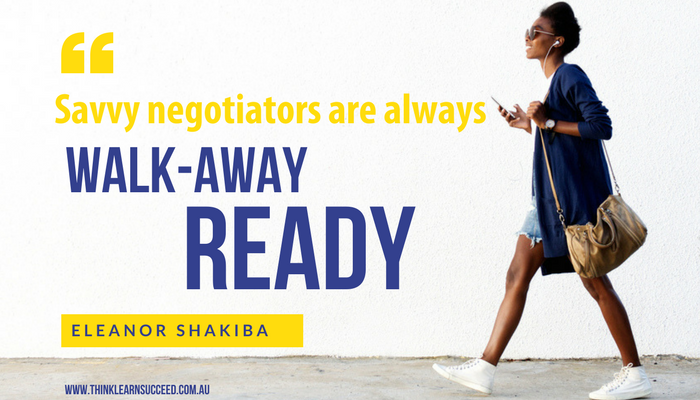
What’s the difference between negotiators who cave in at the first sign of opposition and those who persist, are assertive and create win-win deals? It’s not just skill-set, it’s mindset. I’ve observed thousands of negotiation role plays. And I’ve noticed that people with positive, can-do attitudes tend to get better deals than those with less resilient mindsets. So what is resilience, and how can you apply it in your real-life negotiations?
Resilience is a term taken from Positive Psychology. It’s the ability to bounce back from adversity. Resilient negotiators bounce back when faced with objections, aggression or difficult conversations. Less assertive negotiators struggle to handle dirty tactics or blocking behaviours in negotiation, because they feel threatened. Resilient people, on the other hand, view challenges as a natural part of conflict resolution or negotiation processes. They operate from an optimistic mindset, genuinely believing that problems can be solved and objections successfully handled.
How do they do this? Truly assertive negotiators consistently use four response patterns to move their negotiations beyond ‘no’. These patterns allow conversation to continue, rather than coming to a grinding halt. Here’s a quick overview of these response patterns, which I refer to as the verbal patterns of savvy negotiators.
Free course preview.

SIGN UP FOR YOUR SNEAK PEEK PROGRAM NOW.
Savvy verbal pattern 1: Enquiry. Savvy negotiators are masterful questioners. They use diagnostic questions to uncover the underlying mindsets or needs that are prompting objections. They’re skilled in the art of asking open questions and solution focused questions. Most importantly, their questions stem from a genuine curiosity about how problems can be solved. They’re not used in manipulative ways – for example to ‘manage objections’ or ‘take control’ of the conversation. Savvy negotiators enquire about their counterparts’ beliefs, needs, concerns and positions.
Savvy verbal pattern 2: offering counterproposals. Dynamic negotiators don’t give up when a proposal is challenged or rejected. Instead, they explore why the rejection has occurred and then present counterproposals. The counterproposal is sometimes a modification of the original suggestion, while at other times it is a totally new idea. Resilient negotiators offer these counterproposals in the spirit of finding solutions to problems. Indeed, being solution-focused and optimistic is a core characteristic of people with resilient mindsets.
Savvy verbal pattern 3: presenting concessions and using benefit statements to highlight (or tag) those concessions. Optimistic negotiators are flexible thinkers – they seek way to create a successful deal or outcome. Resilience is strongly associated with creativity and this benefits savvy negotiators. It helps them create genuinely innovative or paradigm-shifting options. Savvy negotiators’ ideas are designed to be attractive to their counterparts. They are presented in ways which tag benefits to the counterpart in accepting those ideas. This increases the resilient negotiator’s influence and builds strategic alliances.
Savvy verbal pattern 4: walking away proactively. In other words, refusing to accept an unprofitable or unattractive deal. Surprisingly, resilient negotiators don’t continue conversations that are proving to have little worth. They refused to get bogged down in being nice. Instead, they accept that walking away may be a positive option. This characteristic of resilient negotiators is what led me to create the term ‘being walk-away ready’ to describe one of the six habits of savvy female negotiators.
You can use these four verbal patterns, too. They are not simply negotiation behaviours. They are also characteristic of people with resilient mindsets in everyday life. The lesson you can learn from this is that if you want to be a successful negotiator, it pays to build a resilient mindset outside of the negotiation context.
About the author of this tip sheet
This article is brought to you by professional development expert, Eleanor Shakiba. Eleanor specialises in teaching social and emotional intelligence skills to people in high intellect roles. Her clients work in academia, education, IT, engineering, finance and health. Eleanor is qualified in Social Anthropology, Applied Psychology, Adult Education and Neuro Linguistic Programming.